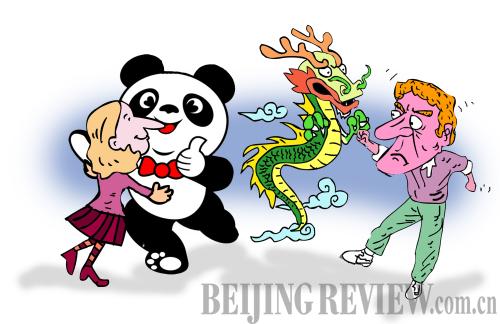|
 |
|
(LI SHIGONG) |
As part of my ongoing—and rather futile—quest to better get to know the country I'm living in, I've recently been reading every "China" book I can get my hands on—and there are plenty thanks to the excellent English-language book shop down the road from me in Beijing. I'm not quite ready for Chinese-language books at this stage. Since I know about 500 characters they would be a long, painful and unenlightening read.
The books I've ploughed through thus far cover an extensive range of genres (from economics to travel writing to philosophy) and, like most Western journalistic coverage of China, their treatment of the country and its many ambiguities ranges from rose-tinted to rather damning. China is certainly not a country that encourages visitors to sit on the fence—in fact, it's practically impossible to stay neutral in your feelings for it if you've lived here for any amount of time—but the huge diversity of opinions and predictions that these books encompass is staggering: If anything, they've left me more confused about China than I was when I started reading.
The most recent book I've dipped my nose into is China Road, a travelogue/social commentary that charts author Rob Gifford's hitchhiking journey from Shanghai to Urumqi in Xinjiang Uygur Autonomous Region. It is the most balanced and objective commentary of China I've read so far. Early in the first chapter the author coins the phrase "panda huggers and dragon slayers" (It may or may not be his, but in either case I wanted to make clear I am plagiarizing it from somebody else —it is not mine), which is without a doubt the perfect way of encapsulating China's schizophrenic effect on its visitors. The moment I read it I thought "which one am I?" and I've been pondering the question ever since.
First, to clarify: panda huggers are total China advocates—people who feel that the world's future rests on the country's massive, burly shoulders, that the Western media gives the Chinese Government a raw deal and that China is simply the most exciting place in the world to be right now. They are in the red corner, as it were.
In the non-red corner, dragon slayers simply don't believe the hype: China will not be the world's next superpower because it does not play by fair economic rules, and all the social unrest caused by rural poverty or human rights abuses will eventually cause the country to "do a Soviet Union."
My expat acquaintances and I spend hours (I don't like to think how many) analyzing, dissecting, critiquing, praising, and slagging off our adopted home, and most of us do fall into one camp or the other, although few of us are at the extreme ends of the panda hugging/dragon slaying scale. The extremists usually have a fairly specific reason for being extremists—for example, I know one panda hugger who isn't actually allowed back into his own country, which has made him extremely grateful to his adopted home, and my biggest dragon slaying acquaintance speaks flawless native English but cannot get a teaching job here because of his Hispanic surname and complexion.
Although these long debates about the virtues and pitfalls of our adopted home are very cathartic, they occasionally make me rather uncomfortable too: We spend a lot of time sitting around in cosy expat bars, vociferously debating the various inadequacies of China—from queuing habits to political obedience—but we have all made a free choice to live here and we take full advantage of the economic, romantic, social and professional opportunities that China offers (and which many of its native citizens don't have access to yet). Sometimes I think: If we all hate the traffic and the spitting and the Chinglish and the weird, non-Western thought processes, why don't we just go home?
The answer to this is obvious of course—you don't get the opportunity to see change and progress on this scale many times in a century, and whatever you feel about China you'll never have a predictable day here.
I would say when it comes to the Chinese people I've got to know I am already a fully signed up panda hugger, but some days I just want to run screaming to the airport and board the first plane to England, or at least lie in a darkened room with a wet towel over my face. On these days I'm more of a dragon slayer, and they can be brought on by anything from a particularly unpleasant news story to a bad day on the Beijing subway. But I have decided I am going to make a concerted effort to move further toward the panda hugging corner of the China boxing ring—well-balanced opinion is one thing and I'm not trying to brainwash myself, but China is not the place for pessimism—and it's certainly not the place for cynicism. If I don't stay on the positive side of the fence, what's the point of living here?
The author is a Briton living in Beijing | 